Ronald Rosbeek in Conversation |
Read more at in70mm.com The 70mm Newsletter |
| Interviewed by: Thomas Hauerslev during the 15th Todd-AO Festival, 2019. Transcribed for in70mm.com by Mette Petersen. | Date: 28.03.2020 |
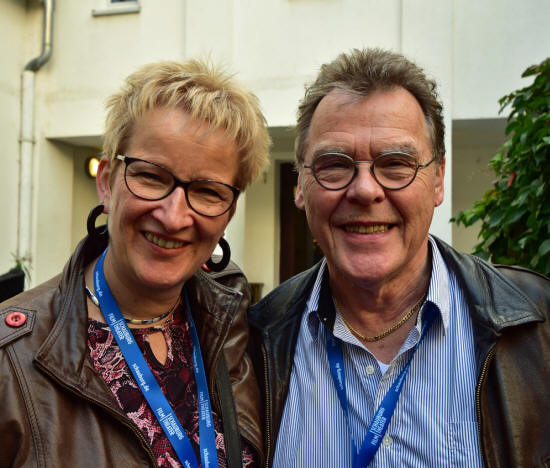 Emmy
Rosbeek-Heida and Ronald Rosbeek at the Schauburg Cinerama in Karlsruhe,
Germany, October 2019. Image by Thomas Hauerslev Emmy
Rosbeek-Heida and Ronald Rosbeek at the Schauburg Cinerama in Karlsruhe,
Germany, October 2019. Image by Thomas HauerslevThomas Hauerslev: When were you born and how did you become involved with cinema? Ronald Rosbeek: I was born in 1953 in The Hague in the Netherlands. Technical things, construction and fine mechanics always fascinated me. During my studies in mechanical engineering, I worked at General Motors for a year to gain practical experience. During that period I also worked as a projectionist. The celluloid virus took possession of me in that theater. From the beginning I was hooked by film and by the presentation. After I had completed the final theory part of my studies, I continued to work in that theater. Fortunately my then-employer, Mr. Schaap, gave me every opportunity to develop myself in the specific technique of cinema. I soon advanced to become the projectionist, and after a year or so I became involved with the technical side of cinema. That was the first time I met Mr. Cas Kessler. It was in 1973, I think, and I was only 21-22 after I completed my studies. The now ninety-year-old Mr Kessler, then an employee at Philips, had a huge influence on my technical development. Via Mr. Kessler I finally became friends with Mr. Jan Kotte who had retired at that time. In fact, I have been lucky that all my employers have given me the space to develop myself. I enjoyed my work as a projectionist in the Roxy theater in The Hague. It was a small, single screen cinema with 550 seats. It was an old cinema built prior to World War II. The booth was up very high, due to the the size of the machines, the carbon arc lamps. I have a 35mm news-reel, where you see the re-opening of the cinema in 1948 and my employer at that time. Of course I wasn't there at that time. I came 20 years later. THa: What was it that appealed to you to become a projectionist? Ronald: Yes, that is difficult to say. Maybe the idea that you are in control of the evening and of the people downstairs? Maybe that? But it was the whole ambience, the sound and colors. Of course it was the time when many of the films were printed in Technicolor. It was a theatre which ran midnight shows. Western movies. Sergio Leone with the close-ups, with the actors as big as this [Ronald stretching his arms out]. I was so intrigued with that, and the technique involved. THa: How many years did you stay as a projectionist, and how did your interest in cinema evolve into becoming a cinema technician? Ronald: I was fortunate because my employer gave me the space to work on the machines. He did not limit me, and at that time I got in touch with the cinema technician Cas Kessler. Mr. Kessler was my first contact and there was a click between us and he became my friend. If I had questions, he always gave me the answers. It was early '70s and it was the beginning of automation of cinemas. I was intrigued by that, and around that time I got my big break because I already had rebuilt the Roxy's lamp houses from carbon arc to xenon. The premiere of "Jaws" in Rotterdam was approaching, and the Philips technician Mr. Berman, was ill or something, and then Mr. Cas Kessler asked me:
|
More in 70mm reading: A Brief History of Philips Cinema Jan Jacob Kotte DP70s in Holland Amsterdam 70mm Cinema History Wide Visit With Willem Bouwmeester Internet link: Rosbeek Techniek Sir Winston Churchilllaan 309 2287 AA Rijswijk Netherlands +31-(0) 70-3194071 +31-(0) 6-53334165 rosbeektechniek.nl |
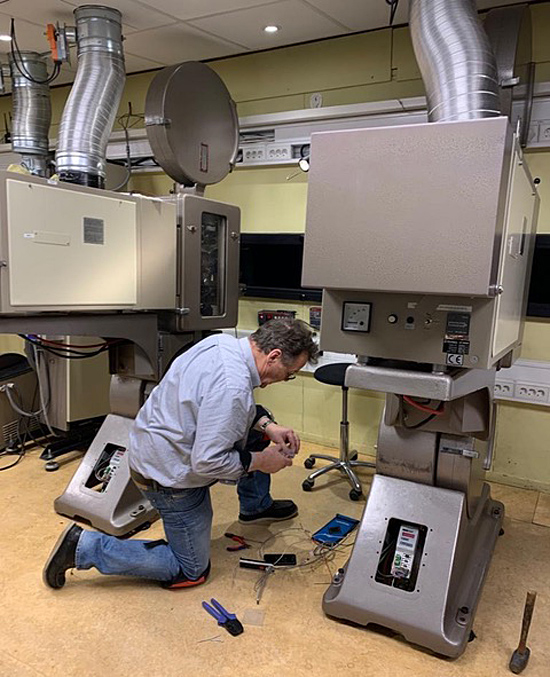 The
master himself on the job in December 2019 installing two DP70s with three-blade shutters at the
Swedish Film Archive's projection room. Picture by Emmy Rosbeek-Heida The
master himself on the job in December 2019 installing two DP70s with three-blade shutters at the
Swedish Film Archive's projection room. Picture by Emmy Rosbeek-HeidaSuddenly I could smell the big world outside my own two small cinemas. The world was open, but my employer was not so happy with that, however. He told my parents, "Ronald will go away, because I know I can't keep him here", and that was what happened. THa: Did work as a "cinema technician" become your way of living? Ronald: Yes, 100%, and it still is. THa: How was the cinema technician business organized in Holland during the '70s? Ronald: After completing the rebuilding of the Calypso cinema in Rotterdam for "Jaws", then Deck Cinema, a cinema chain, was called Meerburg Theaters, which ran 45 theatres all over Holland. Maintenance was terrible at that time. They lost a lot of shows and the management of Meerburg Theaters realized that something had to be changed so they wanted their own technical department. They knew me and asked:
I was
very young, 23 or so and I was very honored that a big cinema chain asked me. Of
course I said yes but I needed a lot of equipment and a space to work. In the Asta theater in The Hague there was unused office space which I could use as a
workshop. I got the freedom to buy everything I needed, from mechanical equipment
to electronics. I was very lucky, and it all went well. This was also the time
that many new small cinemas were built.
That was the moment when I went to Mr. Lauge Nielsen, a Danish guy, the CEO of the Pathé company and I said,
-, and he did. So I left Pathé, and with a
colleague, we built our own
company which we called "Movietech". We had our company and the dealership of Cinemeccanica, which we inherited
from Pathé.
-, and I thought, well
that is great to be the dealer for Cinemeccanica and for Kinoton, but was
never going to happen. Cinemeccanica terminated our agreement. I
wasn't very sad about that, because the Kinoton dealership was by far my favorite.
"Rosbeek Techniek" is now located in Rijswijk, very close to The Hague in the
Netherlands. It is actually in my house, and I have a workshop just around the corner. |
|
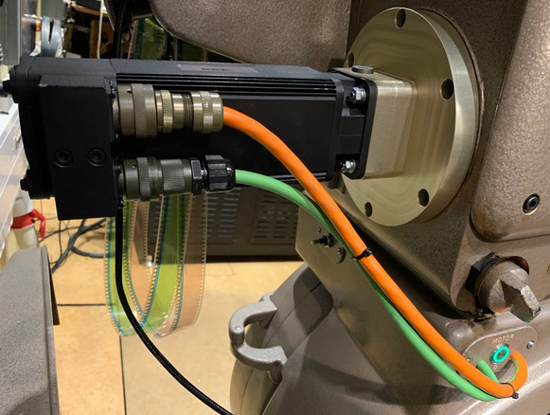 DP70
servo motor which steadies the image of the projector very well. Picture by Emmy Rosbeek-Heida DP70
servo motor which steadies the image of the projector very well. Picture by Emmy Rosbeek-HeidaTHa: How would you describe your company? What do you do? Ronald: From the beginning it was mainly installation work which paid very well, and I was getting good money, but installation work is not my favorite. I like to develop things. So, when the digital came in, they asked me to work with digital cinema. I had to ask myself "What do I want to do?". Of course, to begin with, I replaced all the [film] machines ... and then what? Cleaning filters with the vacuum cleaner, and put in new software. Is that my profession? Did I get an education of many years, for cleaning filters? Is that what it is? I compare it a little bit with a skilled watch maker, who goes to work in a shop and is only replacing batteries all the time. So, if you have learned to repair a Rolex, you don't want to be the battery replacement guy. Instead, in the small world of analog cinema, I met people like Jan Olsen and Torkell Sætervadet [from Norway] and those kind of guys. I found there was a small business for me developing new things for analogue film projectors because I think I was the only one in Holland and abroad to do it. I still am, as far as I know. THa: What kind of things do you develop, if you can mention a couple of things? Ronald: As an example, I have developed new red light readers for analogue sound on 35mm film. I have a private collection of projectors and I had rebuilt my two Bauer B12s with red light readers. My collection of film titles dates back to the late '40s. When I was listening to the old movies, I discovered that the sound was not what I remembered. It sounded like shit. Some films were worse than others. A red-light reader that was only considered as a "shitty" analog back-up for the digital soundtrack, because "everything" was going to be digital when DTS, SR.D and SDDS arrived on the the commercial market. Nobody was very interested in analogue quality of older films at that time. They didn't care. I wanted to improve that. Which I do now. |
|
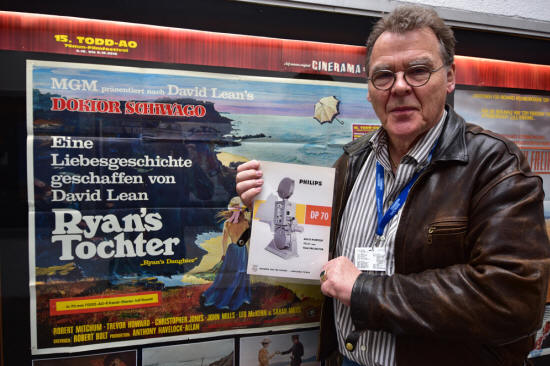 Ronald Rosbeek at the Schauburg Cinerama in Karlsruhe,
Germany, October 2019. Image by Thomas Hauerslev Ronald Rosbeek at the Schauburg Cinerama in Karlsruhe,
Germany, October 2019. Image by Thomas HauerslevTHa: You have talked about Philips projectors, because I know you have a project with the three-bladed shutters. Do you have any special feelings for the DP70? Ronald: I knew Mr. Kotte. Unfortunately, not for a very long period, but he visited me regularly with Mr. Kessler in my workshop. When I worked for the first company, it was in the Asta Theatre in The Hague. I had my workshop there and Mr Kotte and Mr. Kessler came there two or three times a year and there we had some nice lunches. They came over on the train. And it was always nice and in the Netherlands there was also a Dutch club of cinema technicians called NGF. He was also a member of that. I am 66 now and I have never met a guy who knew so much about everything like Mr. Kotte did. It was unbelievable. Actually, if you saw a part on a machine and wanted to know "how did you make that?". If you asked Mr. Kotte that question you would get a reply of three hours, and everything he said was interesting. Every thing! He knew so much about materials. If I could afford it I would spend three years with him, and only for listening to him. He was a fountain of knowledge. And another thing I must tell about him, is very special, because in Eindhoven, of course in the south of Holland is very Catholic, and then you have here God and there is Mr. Kotte [with his arms gesturing above God]. It is true. In the factory, where people were operating a lathe or a drilling machine, he knew them all by name. He knew everybody, and he would ask them:
-, because he knew about the broken leg or
whatever. He asked for it, and he was a very nice person. |
|
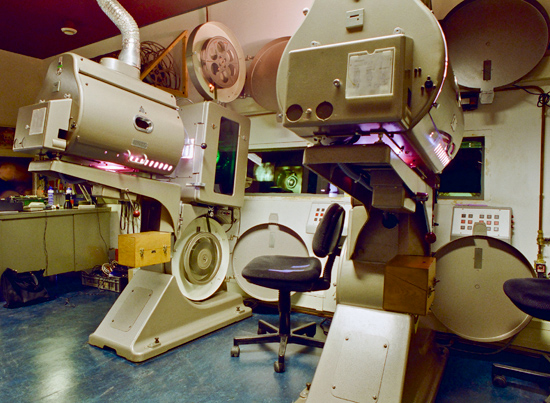 Ronald Rosbeek
installed two DP70 at the Nederland Filmmuseum in Amsterdam. Operational
from 1. October 1991. Machines (2394+2398) came from Philips Division Centre
Eindhoven, Holland. Image by Thomas Hauerslev, 1994. Ronald Rosbeek
installed two DP70 at the Nederland Filmmuseum in Amsterdam. Operational
from 1. October 1991. Machines (2394+2398) came from Philips Division Centre
Eindhoven, Holland. Image by Thomas Hauerslev, 1994.THa: Where are Rosbeek Techniek's customers located? Do you have customers in Holland only, or is it everywhere? Ronald: I don't want to go into the commercial cinemas anymore, because it was never my world. After contact with Jan Olsen and Torkell Sætervadet I discovered another world with people who are really interested in showing films with a high quality, and you can talk at some level with them. • Go to On the Trail of "Windjammer" - A Visit to Oslo If you talk with cinema owners, and because I can be very enthusiastic when I discuss something, you can see the next question on their face: "What does it cost?". Because that is the only thing they are interested in. It is fine, but not for me. When people ask me to upgrade a sound reader to have multiple light sources for example, then I have to develop that because that was never done before. Besides that, I can not fall back on other technicians or literature, because nobody is working in that area. So for new developments, I can only give an estimate price. It is also a matter of trust and therefore is it important that you build a relationship with people. I’m not a big “money maker” but on the other hand I have all the equipment and third parties working for me, and I have to cover those expenses one way or the other. Organisations I’m now working for are: BFI London (upgrading optical readers to white and IR light switchable), Academy Los Angeles (replacement standard motors to servo direct drive, 24V fast dowsers and upgrade optical readers to white and IR light switchable), Egyptian Theater (upgrade optical reader to red and white light) older version, Austrian Film Museum (upgrade optical reader to white and IR light switchable), Swedish Film Archive (rebuild DP70 and full maintenance analog equipment, Norwegian Film Institute (full rebuild analog equipment), Filmhouse Cinema Edinburgh (upgrade optical reader to white and IR light switchable). |
|
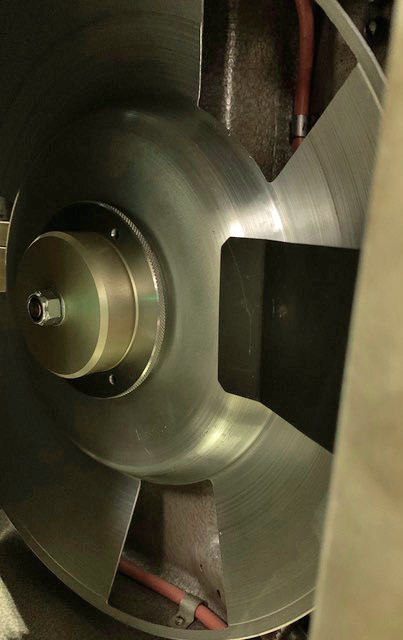 DP70
with three-blade shutter designed by Rosbeek Techniek. Picture by Emmy
Rosbeek-Heida DP70
with three-blade shutter designed by Rosbeek Techniek. Picture by Emmy
Rosbeek-HeidaAbout thirty years ago somebody from the Dutch Filmmuseum, now EYE Filmmuseum Amsterdam, approached me and asked if I knew two good working DP70 projectors. Via Mr. Kessler I was able to buy the two machines from the Philips Division Centre in Eindhoven, because that building was going to be demolished. I made a deal with EYE and since that time those machines are still in use at that new location. • Go to DP70s in Holland • Go to Amsterdam 70mm Cinema History From EYE many times came the question:
But
as we all know, such conversion seems almost impossible because of the construction of
the machine. But the idea of finding a way to realize this never left my
thoughts all those years. I spent many hours in finding a way but it took
several decades to get to the “eureka” moment. And for my idea it should have
the 100% approval of Mr. Kotte, the designer of the DP70, whom I have known
quite well. |
|
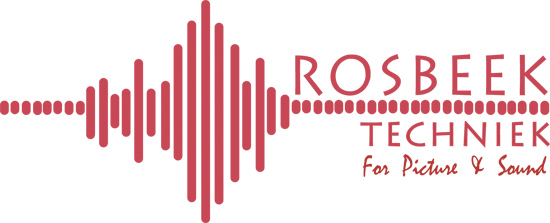 THa: What do you think about 70mm and what does it mean to you? THa: What do you think about 70mm and what does it mean to you?Ronald: "70mm" is not my particular interest with films. What I like about analog projection, maybe sounds a little bit strange, but I like the imperfections. They are always there. I like the hiss of the magnetic sound. The little bit of instability of the frame. I hate digital technique, that they use to remove the lines of Cinerama film. I think that is the attraction for me. I am only talking for myself, for me those artefacts are there, so I hate it when they take them away, because then it is just a bad film. That is all that is left. THa: What do you think of the Schauburg cinema? Ronald: I think it is very good. I think that the screen has a very deep curve, but I did not discover any unsharpness and the light it is very good, so I have not the slightest complaint. THa: Thank you Ronald: You are welcome |
|
| Go: back - top - back issues - news index Updated 22-01-25 |
